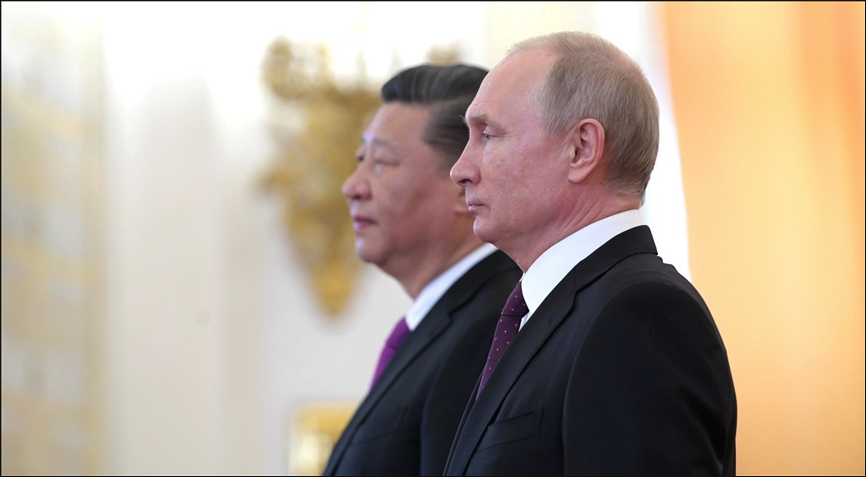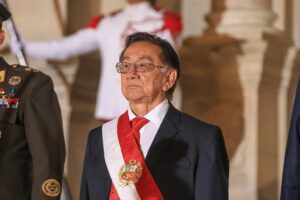
Published 09/21/2023 17:40 | Edited 09/21/2023 19:02
In an international context marked by growing geopolitical tensions, the leaders of Russia and China, Vladimir Putin and Xi Jinping, respectively, announced a bilateral meeting in Beijing for next October. Putin’s trip to China, at Xi’s invitation, signals the strengthening of the alliance between these two countries in the face of challenges and pressure from the West.
During a meeting with Chinese Foreign Minister Wang Yi, Putin expressed his enthusiasm in accepting Xi Jinping’s invitation to participate in events related to the Belt and Road Initiative, which brings together world leaders engaged in China’s development program. The Russian leader highlighted that this cooperation aligns with Russia’s interests and the shared vision of creating a broad Eurasian space.
Both Russia and China have, in recent times, shaped their international agendas in ways that reinforce their opposition to the US-led bloc. Both countries are mentioned in resolutions by Western powers as targets of economic containment. This year marks the tenth anniversary of the Belt and Road Initiative, which has played a key role in increasing China’s global influence.
Wang Yi’s statement reinforced both countries’ commitment to strengthening their multilateral strategic cooperation. Yi emphasized that the world is rapidly evolving toward multipolarity and that economic globalization is advancing despite adversities. Putin told the Chinese chancellor that their positions “coincide regarding the emergence of a multipolar world,” Xinhua reported.
“Economic globalization is progressing against headwinds, unilateral actions are unsustainable and hegemonism is unpopular. Both China and Russia need to strengthen their multilateral strategic cooperation, protect their legitimate rights and interests, and make new efforts to advance the international order toward fairness and justice,” Yi said.
Out of circuit
Russian and Chinese leaders have avoided participating in large multilateral meetings that are attended by Washington and its main allies. This strategic absence was evident in the non-participation of Putin and Xi in the G20 meeting in India, as well as in the UN General Assembly in New York. Instead, both have met with leaders less aligned with the United States, such as North Korean leader Kim Jong-un and Venezuelan President Nicolás Maduro.
With the exception of visiting an occupied territory in Ukraine, the trip to Beijing would be Putin’s first outside Russia in 2023, as he has an international arrest warrant issued by the International Criminal Court (ICC), due to an accusation of deportation of Ukrainian children to his country, and missed a series of summits throughout the year so as not to embarrass ICC signatory countries. Last week, during North Korean leader Kim Jong-un’s visit to Russia, Putin said he had accepted an invitation to visit North Korea, where the ICC arrest warrant is also not valid.
Commercial exchange
The growing economic cooperation between Russia and China has also been highlighted. As Russia faces economic pressure and sanctions from the West, Beijing has become an increasingly important partner. The two countries held joint naval maneuvers in the Pacific Ocean in August, highlighting their military cooperation. Chinese investment in Russia is accelerating, particularly in the energy sector, and bilateral trade is forecast to exceed $200 billion this year.
Shortly before war broke out, Beijing and Moscow announced an “unlimited partnership” between the two countries. Chinese investments in Russia have accelerated as the country imports increasing volumes of energy, fertilizers and cereals from Russia, with bilateral trade expected to exceed $200 billion this year.
First proposed by President Xi Jinping in 2013, the Belt and Road Initiative has established more than 3,000 cooperation projects and mobilized nearly $1 billion in investment over the past decade. More than 150 countries and more than 30 international organizations have signed cooperation documents with China under the ICR.
The strategic alliance between Russia and China represents a significant shift in the global balance of power and has profound implications for international politics. As these two powers consolidate their collaboration, the world is closely watching the implications of these emerging partnerships on global geopolitical and economic dynamics. Putin and Xi’s bilateral meeting in October will certainly be closely watched as another chapter in this evolution.
Source: vermelho.org.br

